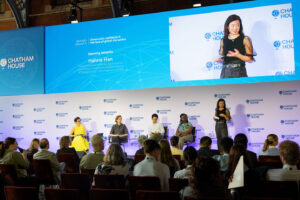
At the 2025 Chatham House London Conference, a spotlight session titled “Democratic Resilience in the Face of Global Disruption” featured an intergenerational group of leaders from Africa, Europe, and Asia who have experienced democracy under strain. Some have lived through repression. Others have faced exile or worked to hold civic space together after a peaceful transition. All see the power within people to help democracy withstand great challenge. The Stavros Niarchos Foundation (SNF) Agora Institute co-hosted the session as part of its mission to strengthen democracy by promoting civic engagement, fostering public dialogue, and facilitating collaborative problem-solving.
SNF Agora supports democracy as a lived practice. The institute builds spaces where people can come together to deliberate and take responsibility for shared civic life. This session reflected that commitment by centering real decisions people make every day to protect and strengthen democratic practices.
SNF Agora Director Hahrie Han opened the session by grounding the conversation in the idea of the agora. In ancient Athens, the agora served as a public square where citizens gathered to debate, listen to one another, and collectively shape decisions. Han reminded the audience that democracy grows in spaces where people engage one another directly. She described it not as a fixed system but as something people build and rebuild through practice.
Chatham House Moderator Orysia Lutsevych OBE, Deputy Director, Russia and Eurasia Programme; Head of the Ukraine Forum, began by naming a familiar pattern that is corrosive of democracy. Public trust weakens. Institutions lose their hold. People stop believing their voices or their votes make a difference. And democracy breaks down.
Anne Applebaum, SNF Agora Senior Fellow and historian, explained how authoritarian regimes have learned to exploit these moments. She traced a shift that began in 2013, when China described democratic values as a threat to party control and continued in 2014 with Russia’s invasion of Ukraine following a democratic uprising. These moves marked the start of a more coordinated effort by authoritarian governments to disrupt democratic norms.
Applebaum described how these regimes maintain the outward appearance of democracy. Courts exist, elections occur, and parliaments meet. But in practice, these institutions no longer serve democratic purposes. She warned that many countries now operate in a hybrid space. They use the language of democracy to mask the concentration of power.
“They turn democratic institutions into theater,” she said. “They keep the form, but not the function.”
Nathan Law, a Hong Kong pro-democracy activist and former legislator, joined the session from exile. He described the loss of support that many democratic movements face. While some governments have backed away, others have remained active. He named countries like Lithuania and the Czech Republic as key allies in the effort to protect democratic rights.
Law shared three lessons for civic movements. First, they must stay grounded in shared values. Second, they must move at a pace that brings people with them. Third, they must keep persuasion at the center of their strategy. He cautioned against relying on digital outrage as a substitute for engagement. “Social media rewards strong emotion,” he said. “But building democracy takes more than visibility. It takes trust.”
Grace Gondwe, a researcher and human rights advocate from Zambia, brought another perspective. In 2021, she helped lead a youth-led mobilization that supported a peaceful transfer of power. But in the years that followed, public expectations went unmet. Economic challenges and limited progress on reform led to frustration.
“People say, ‘You told us this new government would change our lives. Where is the change?’” she said. Gondwe explained that disappointment has quieted civic energy. New digital restrictions and climate-related power outages have also made organizing harder. She stressed that democratic practice must include delivery, not just process.
Sviatlana Tsikhanouskaya, leader of the Belarusian democratic opposition, joined the conversation remotely. She described how her team continues to work in exile while her husband and thousands of other political prisoners remain jailed. They have developed secure digital tools to communicate with citizens within Belarus and to provide reliable information despite the threat of censorship.
She also warned about the rise of fake civil society organizations. These groups look legitimate on the surface but serve authoritarian agendas. Their goal is to confuse and divide. “Democracy still exists in Belarus,” she said. “It lives quietly in the ways people support one another.” Tsikhanouskaya added that people who have lived under authoritarianism often need to relearn what democratic practice looks like. “We have to train ourselves to think democratically,” she said. “It does not come automatically.”
The session reflected a shared view. Democracy requires more than votes and rules. It relies on the habits and relationships people create when they come together with purpose.
A follow-up event, co-hosted by SNF Agora and Chatham House, is scheduled to take place in the fall of 2025. That conversation will explore how participatory, interconnected democracy can address pressing global challenges. Register to learn more about this event here.
To watch the conference, click here. To watch the SNF Agora co-hosted session, navigate to “Spotlight A” on the lefthand menu.

